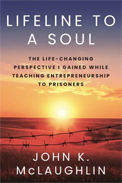
 |
Lifeline to a Soul: The Life-Changing Perspective I Gained While Teaching Entrepreneurship to Prisoners
by John K McLaughlin
Lifeline Education Connection
After owning a successful business and then earning an MBA, the author sets out to get a job as a professor. He finally lands a job at a minimum security prison through a community college outreach program. From there, he learns, and they learn. McLaughlin has a unique story to tell, and, fortunately, is a talented writer, able to put it on paper as a riveting memoir. The title says it all, but the insight and empathy for the incarcerated come from reading every detail of McLaughlin's book. McLaughlin puts the "mates" in inmates. He writes about their humanity, including their feelings, routines, hopes, and/or hopelessness. "To deprive incarcerated people who are ready to put prison behind them the necessary resources to make positive changes in their lives makes no sense to me at all..." writes McLaughlin. It is the takeaway message, in a nutshell.
One of the most poignant points in the book is the realization that some of those prisoners could be almost any of us. Surely, most have done something reckless, probably more than once, but have gotten away with it one way or another, and weren't jailed for their transgressions. Maybe a person drove tipsy but didn't hit anyone, or sold drugs to a friend but never got caught. Other prisoners are products of their environment. Sure, they all made bad choices, but the choices put in front of them during their formative years, likely weren't optimal. It is common to hear that prisoners grew up seeing few good opportunities, and few role models of successful, comfortable adults. McLaughlin, through his own experiences and writings, successfully illustrates how opportunities and education, made available better late than not at all, can turn lives around.